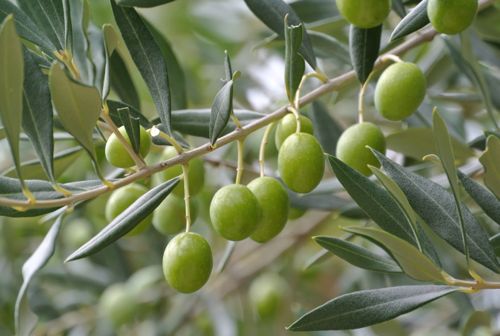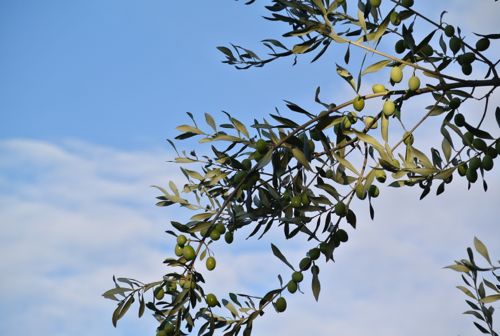
"The Green Gold Culture in Trieste has ancient roots, but it has never been easy. It was the Phoenicians that brought the olive trees on the hills surrounding the most northern bay of the Adriatic sea. Later the Romans came to produce olive oil on these limestone lands, nestled between cliffs and sinkholes, near the coast. they learnt to challenge the frequent frosts and bora, katabatic wind that often blows over one hundred kilometers per hour. the activity becomes profitable and already at that time each farm in Trieste and Istria has its own olive press. Through the centuries the Julian olive growing has its moments of prosperity and business development, but also stagnation. The activity blooms in the Venetian era, but it will take years of hard work, perseverance and dedication, to get to today's results. " Thus the article by Carla Ciampalini begins on Food24, Nutrition blog of Il Sole 24 Ore in which a contribution by Elena Parovel appears, interviewed for the occasion: "«Quality and territorial belonging are the two qualitative elements of our olive oil» explains Elena Parovel, president of the Committee for the extra virgin olive oil exploitation and promotion in the province of Trieste. So, conventional techniques over the years have been able to combine the ability to exploit technological innovations that led to strict checks of the entire chain, from cultivation to production, to evo oils storage. An effort that has allowed us to reach in 2004 the protected designation of origin, the product Tergeste Dop guarantees an undisputed environmental, landscape and economic value.
 On the insert Northeast Events by Il Sole 24 Ore they speak of the internationality of Parovel’s evo oil: from fairs to cooking schools, through events and tastings, for many years the company has made known the extra virgin olive oil from Trieste throughout the world. "Those who choose our evo oil they choose it for the autochthonous varieties of the zone, the Bianchera, but also because we check the entire supply chain. The pressing takes place in our oil mill with direct control over the olives and processing". In short, globalization doesn’t bring about only troubles, but allows businesses that preserve the craftsmanship and territoriality to delivering their vision, introducing the heterogeneity of Italian offer. "What’s curious - Elena Parovel says - is that abroad we are chosen by cooking schools for their courses. We are proud of this, we are the first to emphasize the importance of a proper education about extra virgin olive oil, as well as the only mill open to the public in autumn in Friuli Venezia Giulia during the harvest campaign, with the possibility of guided tasting. With these sensory educational we believe we promote the good that our territory produces and bring it to the attention of those that live on territory, perhaps ignoring the excellence of its food." In fact, not many people know that in the Northeast an excellent extra virgin olive oil is made and probably a few know that Tergeste Dop exists, the only protected designation of origin of the oil from Friuli Venezia Giulia. Along with many other manufacturers also Parovel brings its extra virgin olive at Olio Capitale, 10. Exhibition of typical and quality extra virgin oils, from March 5 to 8, in the Maritime Station location on the waterfront of Trieste. One more opportunity to taste the extra virgin olive from Trieste.
On the insert Northeast Events by Il Sole 24 Ore they speak of the internationality of Parovel’s evo oil: from fairs to cooking schools, through events and tastings, for many years the company has made known the extra virgin olive oil from Trieste throughout the world. "Those who choose our evo oil they choose it for the autochthonous varieties of the zone, the Bianchera, but also because we check the entire supply chain. The pressing takes place in our oil mill with direct control over the olives and processing". In short, globalization doesn’t bring about only troubles, but allows businesses that preserve the craftsmanship and territoriality to delivering their vision, introducing the heterogeneity of Italian offer. "What’s curious - Elena Parovel says - is that abroad we are chosen by cooking schools for their courses. We are proud of this, we are the first to emphasize the importance of a proper education about extra virgin olive oil, as well as the only mill open to the public in autumn in Friuli Venezia Giulia during the harvest campaign, with the possibility of guided tasting. With these sensory educational we believe we promote the good that our territory produces and bring it to the attention of those that live on territory, perhaps ignoring the excellence of its food." In fact, not many people know that in the Northeast an excellent extra virgin olive oil is made and probably a few know that Tergeste Dop exists, the only protected designation of origin of the oil from Friuli Venezia Giulia. Along with many other manufacturers also Parovel brings its extra virgin olive at Olio Capitale, 10. Exhibition of typical and quality extra virgin oils, from March 5 to 8, in the Maritime Station location on the waterfront of Trieste. One more opportunity to taste the extra virgin olive from Trieste.
 In 2003 the oil journalist, or oleologist as he likes to be called, and director of the magazine Teatro Naturale Luigi Caricato, devoted to Elena a great interview whose contents are still very valid today, with the theme of the ethics of production back in vogue. Below there's a brief excerpt of the interview.
In 2003 the oil journalist, or oleologist as he likes to be called, and director of the magazine Teatro Naturale Luigi Caricato, devoted to Elena a great interview whose contents are still very valid today, with the theme of the ethics of production back in vogue. Below there's a brief excerpt of the interview.
How long have you been involved in agriculture and with what results?
I am the fourth generation. Our company was founded at the end of '800 with my great-great grandfather. I work full-time since 1991. As a child I followed my parents in the vineyards and in the olive groves. A satisfactory outcome in economic terms; in Trieste Karst it is not easy: we need passion and tenacity with specific aims.
Are you happy, puzzled or worried?
I am satisfied because the consumer has finally realized that the quality of food becomes health. This allows agriculture to have a long life!
Why has the rural world lost centrality and importance in recent decades?
Well, the agri-food industries have contributed their bit, but I think the rural world has always remained firmly rooted to their handicrafts, which, fortunately, are re-emerging.
Do you believe that the agricultural sector will still remain a primary sector in Italy?
Yes. For the many territorial peculiarities.
And why did you choose to work in agriculture?
I can not say I have chosen: I was simply born into a family of farmers. And I stay there because I like the contact with the earth, its natural mystery.
Food, its production methods but also the ways of cooking of what we eat are becoming increasingly important in industrialized countries. Probably, it is a way to return to a more healthy and less sophisticated lifestyle.
Today in Italy those who follow a vegetarian or vegan diet is equal to 5.9% of the population that is quite a figure, but another trend is more and more affirming, ie the raw food diet: a form of diet which crosses vegetarian, vegan, demitarian groups and lovers of good food in general.
Surfing the web we found the interesting blog Spaghetti e Mandolino and here we quote:
"Le'ts begin to learn these two words: RAW FOOD. A new frontier?
Well if you think about it it is the diet of Homo Sapiens in its early days when it was not able to discover the benefits of the fire god. Raw food means all those foods which have not been firing through the use of heat to the flame. Who have not lost all their nutritional components due to high temperature.
At SANA in Bologna, the international Organich Food event what has emerged with greater strength is this new frontier. Adopted by many Hollywood movie stars, raw food is becoming a movement much later in our country on the part of women and men especially in vegan version.
And therefore the proliferation of vegetables, dried fruits, legumes creams, cereals, smoothies, etc ... but the raw food apart from its its vegan soul reveals its potential with all those meats that have not been cooked and are many. Parma and San Daniele ham but also of all horse steaks and other dried meat in the pure more ancestral style.
 As in the rest of the Italian peninsula in this extreme angle to the northeast the production promises to be rich and healthy.
As in the rest of the Italian peninsula in this extreme angle to the northeast the production promises to be rich and healthy.
Clearly the climate that we'll experience in the next few weeks will still affect the oily degree and the quality of the harvest, but so far we can say that here in Trieste the hot not overly dry summer and the relative low humidity, thanks to the rather constant presence of ventilation and fresh gusts of Bora, have led to a particularly healthy production. We must also thank the favorable climate that during the flowering/fruit set in June appeared quite stable. The production situation is therefore rather homogeneous in all Parovel's olive groves, both in terms of quantity and quality with a good flesh/kernel ratio and also the olive fly was stopped by the drought and strong heat of July. The olive oil campaign in Trieste and in particular in the area of San Dorligo della Valle - Dolina will begin soon in the mid/late October and the olives that will be pressed first will be those of Leccino, Pendolino, Leccio del Corno, Maurino, and Buga (another olive tree native of our area along with Carbona or Cernica), the last one will be the Bianchera variety.
 All these are the plants we've been growing for decades in our olive groves, in the Friuli Venezia Giulia San Dorligo della Valle - Dolina was the first facility in intensive olive grove (1985) with a pioneering work by 4 producers Trieste, including our company with dad Zoran Parovel then to run. What makes the virgin product in this area so unique? The ripening always depends from exposure as well as for all the fruits - we must never forget that in fact the olive is a fruit - and in the territory of San Dorligo della Valle / Dolina we have micro-zones characterized by their own microclimate, which it contributes to the early or late ripening.
All these are the plants we've been growing for decades in our olive groves, in the Friuli Venezia Giulia San Dorligo della Valle - Dolina was the first facility in intensive olive grove (1985) with a pioneering work by 4 producers Trieste, including our company with dad Zoran Parovel then to run. What makes the virgin product in this area so unique? The ripening always depends from exposure as well as for all the fruits - we must never forget that in fact the olive is a fruit - and in the territory of San Dorligo della Valle / Dolina we have micro-zones characterized by their own microclimate, which it contributes to the early or late ripening.